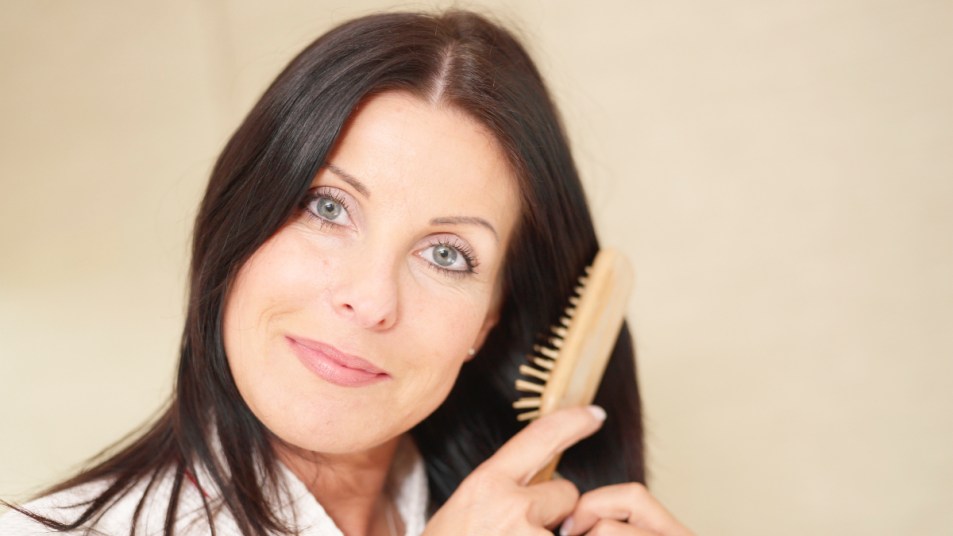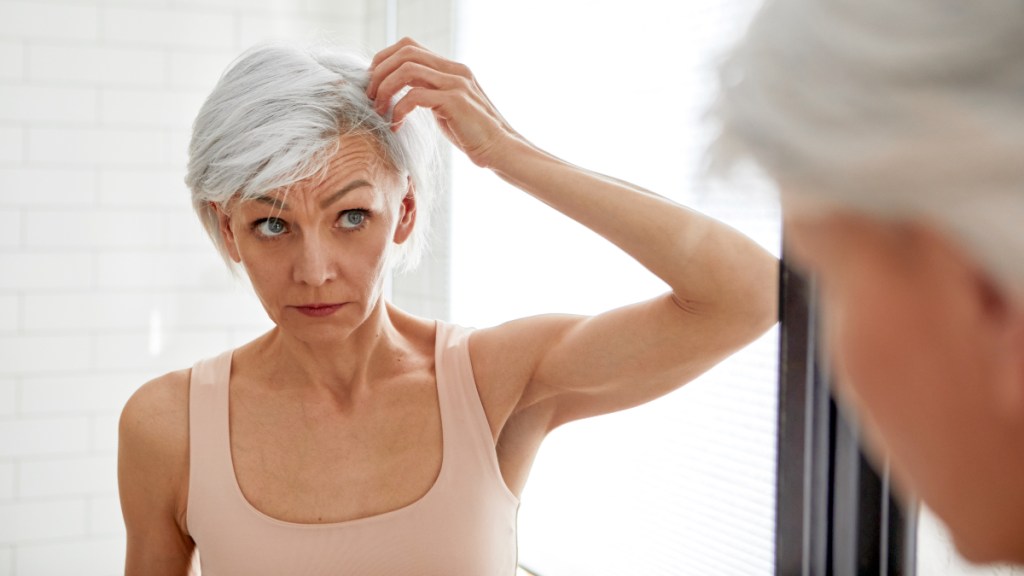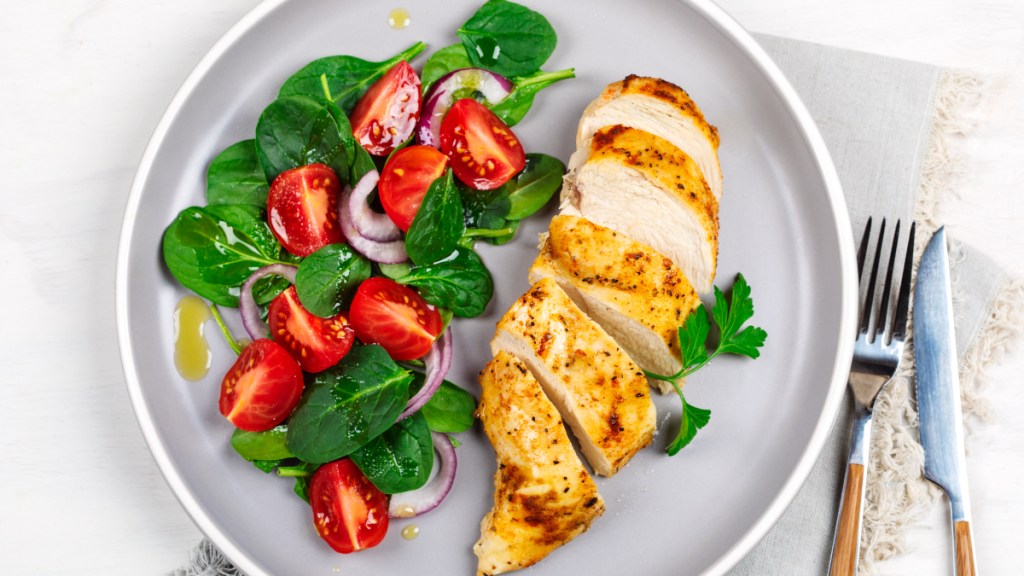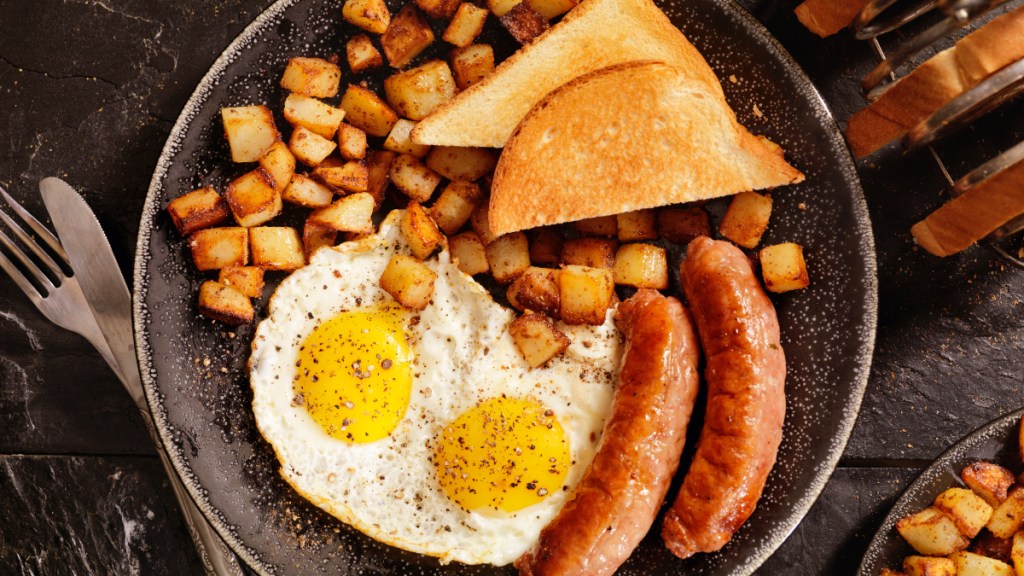This Sneaky Vitamin Deficiency May Be the Cause of Your Thinning Hair — Here’s How to Really Fix It
Find out the nutrient shortfalls that can cause sparse strands, and why a supplement isn't your best bet

It’s no surprise that hair loss becomes more common as we age. Most of the time, there are multiple factors responsible for thinning strands. And that includes falling short on certain key nutrients. But which vitamin deficiency causes hair loss, and how can you get growth back on track?
“Certain restrictive diets may contribute to hair loss and hair changes,” notes Marisa Garshick, MD, a dermatologist in private practice and clinical assistant professor of dermatology at Weill Cornell Medicine in New York City. “Additionally, deficiencies in certain minerals may cause hair to be weaker and less likely to grow.”
Fortunately, figuring out what vitamin deficiency causes your hair loss — and getting your fill of the nutrient — can help bring thin, limp strands back to life.
The most common causes of hair loss
It’s normal for hair growth to slow as we get older. In fact, up to 60% of women report having fewer, thinner strands by age 60. Hormonal shifts that happen during menopause are partly to blame, since estrogen is involved in hair growth, explains Annabelle Garcia, MD, a board-certified dermatologist in San Antonio, TX, who conducts research with UT Southwestern Medical Center. Genetics also plays a role. In one Advances in Dermatology and Allergology study, a family history of hair loss was present in 62% of women who were suffering from hair loss themselves.
Other factors can include:
- Nutritional deficiencies: You may be more likely to miss out on certain vitamins or minerals if you’re cutting calories or eating a very restrictive diet, Dr. Garcia notes. In some cases age can also be a factor, suggests a review in Nutrients. Our bodies have a harder time absorbing the nutrients from food over the years, and older adults may be less likely to eat a well-rounded diet. Medications like antacids, high blood pressure drugs, cholesterol-lowering drugs and hormone replacement therapy can affect your ability to absorb certain nutrients, too.
- Autoimmune conditions: According to Dr. Garshick, autoimmune conditions like an underactive thyroid can contribute to hair loss.
- Certain medications: Chemotherapy drugs, blood thinners, blood pressure medications, antiseizure drugs and cholesterol-lowering medications can all increase hair loss.
- Extreme stress: Hair loss can stem from extreme emotional stress (like a divorce, death in the family or financial worries) or physical stress (like having surgery or a serious illness or injury), Dr. Garshick says. (Click through to learn how toning your vagus nerve with cold water helps undo the toll chronic stress takes on your body.)
How you can tell if you’re losing your hair
You can probably tell just by looking in the mirror if your strands have gotten considerably thinner. “I have patients say, ‘I can see my part, it’s getting wider’. Or ‘I had a very robust ponytail and now it’s thin and brittle’,” Dr. Garcia says.

Other clues can tip you off sooner. “It’s normal to lose 50 to 100 hairs per day, and some women can sense when they lose more than this,” Dr. Garshick says. Telltale signs can be seeing clumps of hair in your brush, on the floor, on your pillowcase or by the shower drain, she says.
How to check for vitamin deficiencies
Start by seeing a board-certified dermatologist, recommends Dr. Garcia. They can run a blood test to what nutrients you might be missing out on while assessing other factors that might also be contributing to your hair loss.
If you’re not getting enough of a certain vitamin or mineral, you and your doctor can also decide the best way to correct the problem. Minor shortages can often be fixed just by eating more of certain foods. “When dealing with hair loss, it is important to eat a well-balanced diet,” Dr. Garshick adds. No need to splurge on pricy, specialized supplements.
However, if you’re severely deficient, your doctor might recommend a supplement in pill form or as IV infusions. But you shouldn’t supplement without getting the green light first, warns Dr. Garcia, since getting too much of certain vitamins or minerals could actually be harmful.
Which vitamin deficiency causes hair loss?
Your body relies on certain nutrients to grow fresh, healthy hair strands, Dr. Garshick points out. Over time, not getting enough of these vitamins could potentially leave your hair looking thinner and less healthy. But when it comes to which specific vitamin deficiency causes hair loss, there are six common offenders that can play a role, according to Dr. Garshick and Dr. Garcia.
1. Iron
Around 10% of postmenopausal women are deficient in iron. And “sometimes patients with low iron notice they’re shedding more,” Dr. Garcia says. Iron is a key ingredient in hair cells, and not getting enough can stress the body and trigger large numbers of hairs to abruptly stop growing and shed.
How much you need: 8 mg per day
Where to find it: “Iron can be found in fortified cereals, spinach, lean red meat, chicken and fish and tofu and beans, though some people may require a supplement,” Dr. Garshick says. Whenever possible, enjoy iron-rich foods with a source of vitamin C (like oranges, strawberries, broccoli or bell peppers). Doing so helps your body absorb up to 6 times more iron, according to a review in ACS Omega.

2. Zinc
Hair loss is a common sign of a zinc deficiency. Fortunately, shoring up your levels can help spur new growth, found a review in Dermatology and Therapy. “Zinc helps support the various proteins that are involved in maintaining and promoting structural support of the hair,” explains Dr. Garshick. (Click through to learn how pairing zinc with quercetin can boost your immunity, too.)
How much you need: 8 mg per day
Where to find it: Beef, fortified breakfast cereals, pork, turkey breast, pumpkin seeds, cheddar cheese, lentils, peanuts and shrimp.
3. Folate
Like iron, folate is a building block for new hair strands, Dr. Garshick explains. And though the research is limited, some evidence suggests that being deficient in the nutrient could lead to hair loss, concluded the review Dermatology and Therapy.
How much you need: 400 mcg DFE per day
Where to find it: Leafy greens, Brussels sprouts, fortified breakfast cereals, avocado, romaine lettuce, black-eyed peas and kidney beans.
4. Protein
“Protein intake is important to support hair and nail strength and growth,” notes Dr. Garshick. That could be because certain protein amino acids are involved in your body’s ability to use iron and zinc, which are directly tied to hair growth, suggests a Baylor College of Medicine study.
How much you need: At least 0.8 grams of protein per kilogram of body weight is recommended for adults. But to optimize hair growth, aim to get 1 to 1.2 grams of protein per kilogram of body weight. That’s around 75 to 90 grams protein for a 165-pound woman.
Where to find it: Lean red meat, poultry, seafood, Greek yogurt, cottage cheese, milk, eggs, beans, legumes, tofu, nuts and seeds. (Click through to learn how trendy protein coffee can up your intake of this key nutrient in a delicious way.)

5. Biotin
The B vitamin biotin is involved in the production of keratin. This is a key protein that helps form the outer layer of your hair and nails. “Because those that are truly deficient in biotin have been found to have thinning hair and brittle nails, it is thought by replacing biotin you can strengthen both the hair and nails,” Dr. Garshick says. “The caveat is that most people are not truly deficient in biotin.” And the jury is still out on whether supplementing truly makes a difference, research shows. Your doctor can order a blood test to check your biotin levels if you’re unsure.
How much you need: 30 mcg per day
Where to find it: Eggs, salmon, pork, sunflower seeds, sweet potatoes, almonds, tuna, broccoli and spinach.
6. Vitamin D
People experiencing hair loss have been shown to have lower levels of vitamin D than those with fuller hair, according to the review Dermatology and Therapy. In particular, “it can contribute to hair loss in women with autoimmune disorders [like alopecia areata],” though experts don’t yet fully understand why, Dr. Garcia says. (Click through to learn how a vitamin D shortfall can cause fatigue, too.)
How much you need: 600 IU per day for women ages 50 to 70 and 800 IU daily for women over 70
Where to find it: “It’s generally best to get vitamin D from a supplement, since it’s not found in many foods,” notes Dr. Garshick. “But it can be found in foods such as salmon, eggs and milk and cereal that have been fortified.” Your body also naturally makes vitamin D when bare skin is exposed to the sun’s rays. Try rolling up your sleeves and popping outside midday for 10 to 20 minutes to boost your levels.

How soon can you see results?
Reversing a vitamin deficiency that causes hair loss will usually lead to thicker, healthier hair. It can take some time, though. “I tell patients, this is the patience game,” Dr. Garcia says. “Hair is slow in terms of recuperating from any stressor. I say give it at least 4 to 6 months to see results.”
Tip: Need a right now volume boost? Click through to see how to style thinning hair so it looks twice as thick.
For more ways to keep your hair thick and healthy:
Dermatologist-Recommended Shampoos for Hair Loss — Discover What’s Right for You
Top Hair Loss Doctor Explains How Rice Water Can Help Reverse Thinning + Add Shine
Dr. Jen Ashton Gets Real About Menopause, Hair Loss and Mental Health Over 50
This content is not a substitute for professional medical advice or diagnosis. Always consult your physician before pursuing any treatment plan.

















